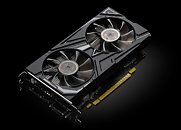Wednesday, April 24th 2019

NVIDIA GTX 1650 Lacks Turing NVENC Encoder, Packs Volta's Multimedia Engine
NVIDIA GeForce GTX 1650 has a significantly watered down multimedia feature-set compared to the other GeForce GTX 16-series GPUs. The card was launched this Tuesday (23 April) without any meaningful technical documentation for reviewers, which caused many, including us, to assume that NVIDIA carried over the "Turing" NVENC encoder, giving you a feature-rich HTPC or streaming card at $150. Apparently that is not the case. According to full specifications put out by NVIDIA on its website product-page that went up hours after product launch, the GTX 1650 (and the TU117 silicon) features a multimedia engine that's been carried over from the older "Volta" architecture.
Turing's NVENC is known to have around 15 percent performance uplift over Volta's, which means the GTX 1650 will have worse game livestreaming performance than expected. The GTX 1650 has sufficient muscle for playing e-Sports titles such as PUBG at 1080p, and with an up-to-date accelerated encoder, would have pulled droves of more amateur streamers to the mainstream on Twitch and YouTube Gaming. Alas, the $220 GTX 1660 would be your ticket to that.
Sources:
Quickshot_Gaming (Reddit), NVIDIA
Turing's NVENC is known to have around 15 percent performance uplift over Volta's, which means the GTX 1650 will have worse game livestreaming performance than expected. The GTX 1650 has sufficient muscle for playing e-Sports titles such as PUBG at 1080p, and with an up-to-date accelerated encoder, would have pulled droves of more amateur streamers to the mainstream on Twitch and YouTube Gaming. Alas, the $220 GTX 1660 would be your ticket to that.

92 Comments on NVIDIA GTX 1650 Lacks Turing NVENC Encoder, Packs Volta's Multimedia Engine
Why would they even go to the expense of doing this??? It can only be to trick customers, or create artificial barriers.
Nasty, petty minded company, with an open contempt for its own customers.
Ngreedia's backwait they never left town :shadedshu:NO, 1650 still has the NVENC encoder. The only missing feature is the HEVC B-frame support (introduced in Turing).
Basically, it's the same encoder we had in Pascal.
How solid must 1650 be if the usual anti-Nvidia nitpicking results in an article about missing hardware encoder? And the one that's not true? :eek:
Also what about the up to 15% better efficiency via Turing NVENC?
It really still should be labeled as - RUMOR
I'm not a fan of either AMD or Nvidia but I do think Nvidia intentionally buried this information so people would assume it had the new encoder fully enabled. Shady as hell, but to be fair, they all do this kind of thing.
Not much different than AMD calling the new apus 3000 series when it is based on the Zen+ architecture and not Zen 2 like the 3000 series processors.
Obviously, it could be way more than 15% in some specific cases.
I wonder how many people commenting in this thread know what B frames are (or at least heard about them earlier).
The article's author likely doesn't...
The Volta encoder was a marginal step up from Pascal, and the Turing encoder was a step up from Volta. This helps if you're encoding 4K+ content, especially when streaming and need to encode 4K+ content in real time.
But how many streamers do you think will be buying a GTX1650 and playing games in 4K? I bet none.
developer.nvidia.com/video-encode-decode-gpu-support-matrix
Though that 15% better should have some real world numbers shown. But yeah for HTPC usage nvenc is just pointless anyway, it has that very good HW decoder from other Turings and that is all that matters.
Edit: Ahh that was 15% more efficient not more performance, quite different things.gt1030 is entry level gaming/multimedia card. xx50 series has usually been low end gaming.
If you ever decide that encoding is too hard on your CPU, just get an Intel NUC / 3rd part Barebone with Quick Sync support (or maybe you already have an Intel laptop lying around).
It should be at least Kaby/Gemini Lake to support 4K HEVC.
In fact I don't even know how streaming with two PCs work, so no, I don't have an another machine for that. :D
Problem with streaming on gpus is h.264 that every streaming service uses, it can be done with gpu but the quality is crappy on lower bitrate, thus cpu encoding is usually way to go. H.265 would work better, but no service provider want's to pay that license fee for MPEG LA and I don't really blame them.
Software encoding with "faster" preset, 720p output @ 3000kbit/s and watchers said that works flawlessly.